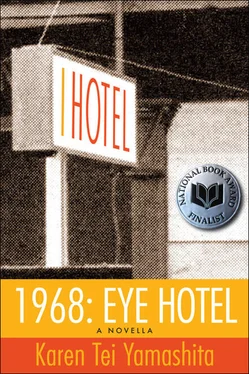They only remember that he hoisted himself onto the back of a truck parked at the gateway of our once peaceful college and tore out the wires to a sound system. The truck was being used as a stage for ranting and epithets. Free speech, his tam-o’-shanter! He surprised them by climbing onto that truck, yelling, “Don’t touch me! I’m the president of the college!” He jumped up and down and mimicked their ridiculous chants: On strike! Shut it down! On strike! Shut it down! He had a plan to beautify the campus, plant flowerbeds and pipe in swinging music on the intercom. He might have piped in his entire twenty-part jazz seminar, complete with musical examples. Instead we got this mindless ranting.
One of his colleagues yelled out his name, attaching it to General Tojo. He peered through those thick black horn-rims into the crowd. A sansei student had a sign with his caricature that said, “Tojo is alive and well and living under Mt. Tam O’Shanter.” He had spent his life’s work in general semantics, articulating a theory of language to fight precisely this sort of fascism. He fired that colleague Chen on the spot. Later he had to capitulate. He told Chen he had meant to say “Shame on you!” but after all, didn’t he understand his fury?
Someone had ripped his tam-o’-shanter from his head. He saw it spinning in the air, tossed from hand to hand. This was typical of the disrespect he had to contend with. As he said, the leadership of the SDS and the BSU had shown themselves to be a gang of goons, gangsters, conmen, neo-Nazis, and common thieves. And he was Tojo?
This was precisely the sort of semantic error he tried to point out in his comments to the faculty senate when he said, “I wish to comment on the intellectually slovenly habit, now popular among whites as well as blacks, of denouncing as racist those who oppose or are critical of any Negro tactic or demand. If we are to call our college racist, then what term do we have left for the government of Rhodesia?” He must have heard someone yell out, “Racist! Racist!” He continued, “Black students are again disrupting the campus. A significant number of whites, including faculty members, condone and even defend this maneuver. In other words, there are many whites who do not apply to blacks the same standards of morality and behavior as they apply to whites. This is an attitude of moral condescension that every self-respecting Negro has a right to resent, and does resent.”
As a self-respecting minority himself, he felt he could speak for the Negro. And this was not the first time. In one of his many books, he devoted an entire chapter to the subject: “The Self-Image and Intercultural Understanding, or How to be Sane though Negro.” The tenants of this chapter were simple. If the Negro has a self-concept of I am a Negro accompanied by a sense of inferiority, he will act obsequiously, and the white person he encounters may act with superiority. If the Negro has a self-concept of I am a Negro accompanied by a sense of defensiveness, he will act counter-defensively, and the white person may act offensively. If the Negro has a self-concept of I am a Negro as a simple statement of fact, then he will act naturally, and the white person may act naturally too. Therefore, the power to determine the outcome of a meeting lies with the Negro. Now the Negro might say that he is acting naturally, but how do you know you are acting naturally? The secret to acting naturally is exemplified in the famous person, a movie star or prime minister, who forgets he is famous and acts naturally. To act naturally, you have to forget that you are Negro. Why shouldn’t this be possible—our acting president himself was able to forget he was Japanese. White people are ignorant and require psychotherapy to get over their obsession with skin color; so, the Negro must act as the white person’s psychotherapist. Granted, this will be accepted in small steps, but the basis for happiness is minimum expectations. In the long struggle for equal rights and opportunities, because of the strong moral sense of the nation as well as economic and practical necessity, segregation must eventually end. This is the self-fulfilling prophecy of political democracy, and communication is the first step.
However, psychotherapy at the impasse of the current breakdown in communications was no longer possible. Didn’t the faculty realize, as our acting president did, that the SDS had assumed tactics similar to those of the Nazis of the thirties, intending to disrupt democratic institutions and bring down the political structure? He characterized the BSU leadership as actuated by self-hatred, strutting about self-consciously behind dark glasses, playing Black Panther, stalking in gangs, scaring little girls. This behavior, he said, would have been simply pathetic if knuckleheaded whites didn’t take them seriously. He never took them seriously. He recognized the primitive and animistic notions embedded in their language that prevented them from comprehending civilized paths to a democratic society. This was what he had characterized as the “Jim Crowing of the mind.” Segregation was not a physical condition but a mental condition. He knew they were all flying high as kites on dope.
He only took this job on the condition he be allowed to call in the police. He testified to Congress that to restore proper order during campus unrest, troops should be sent in early, and lots of them. He personally addressed the police himself as they entered the campus, advising them to ignore the students’ bad words and to smile. Bad words, he said to them, can’t harm you, and shouting them allows the students to blow off steam. Cursing has a therapeutic effect. However, if arrests were necessary, they would not be made in vain, for he would offer no amnesty to students. He further offered his knowledge of general semantics, saying some people, as the result of a childhood experience, cannot help being frightened by the mere sight of a policeman. Similarly, some people automatically become hostile at the words un-American, Nazi , or Communist. This is the unfortunate business of being blinded by prejudice and living in the delusional world of abstractions.
Ten thousand letters came to his desk supporting his decisive actions. The governor himself saw him on television and announced to his cohort, “I think we’ve found our man.” Our acting president was not only exhilarated by this response, but also by the confrontation itself. It was a rollercoaster he rode with the excitement of a child born again.
Although no one took his dismissal of Chen seriously, it was cited as a further example of our acting president’s autocratic highhandedness. During the strike Chen used a café in North Beach as his classroom. The Brighton Express on Pacific Avenue was a popular café and hangout for the bohemian crowd. A nisei woman named Joanna ran the café. In the past, when the president enjoyed the local jazz scene, on occasion he too frequented the café. Joanna, always good-humored and friendly, called him “Professor.” One supposes she called Chen “Professor” too. During the strike, they were all teaching their classes off campus somewhere, in their homes or in churches. This business with the strike was nonsense. No student wanted to lose a year of coursework. No teacher wanted to waste his time on a picket line.
Students gathered around a couple of tables, and Chen began his lecture, “Mao Tse-Tung on Literature and Art.” “Comrades!” he both addressed the students and quoted from Mao. “ You have been invited to this forum today to exchange ideas and examine the relationship between work in the literary and artistic fields and revolutionary work in general . . . This,” he said, “is how Mao addressed the Yenan forum twenty-six years ago on May 2, 1942.”
Читать дальше












